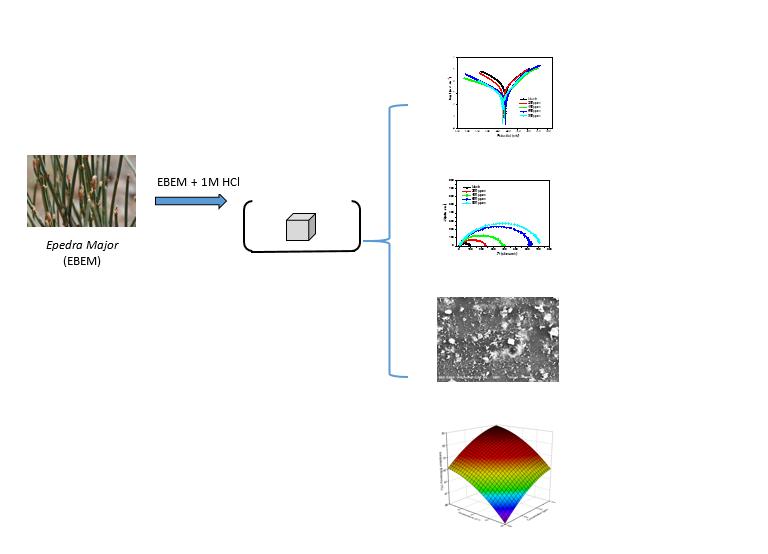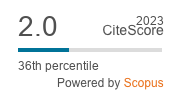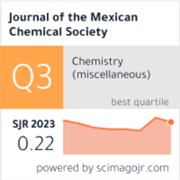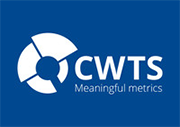Experimental Study and Modeling of the Corrosion Inhibition of Mild Steel in 1M Hcl with Novel Friendly Butanolic Extract of Ephedra Major
DOI:
https://doi.org/10.29356/jmcs.v66i2.1630Keywords:
Ephedra major, corrosion, mild steel, hydrochloric acid, linear regression, quadratic regressionAbstract
Abstract. A novel Butanolic extract of Ephedra major (denoted EBEM) was investigated as corrosion inhibitor for mild steel in 1 M hydrochloric acid solution. The investigation was carried out using weight loss, electrochemical impedance spectroscopy (EIS), Tafel polarization measurements, Fourier transform infrared spectroscopy (FT-IR), and scanning electron microscopy (SEM) methods. The effect of temperature on the corrosion behavior of steel in HCl with the addition of the inhibitor was investigated in the temperature range 20-60°C. The inhibition efficiency was observed to increase with increasing concentration of the extract EBEM and deceased with increasing the temperature. Tafel curves have revealed that the EBEM possesses the indices of a mixed inhibitor. The adsorption of the inhibitor on the steel surface, follow Langmuir isotherm and its mode was found to be physical adsorption. Thermodynamic parameter (ΔG°ads) and activation parameters (Ea, ΔHa and ΔSa) were calculated to investigate the mechanism of inhibition. Obtained data were analyzed by suggesting two mathematical models based on linear and quadratic regressions, which takes into account the effect of concentration and temperature upon the inhibition efficiency. Experimental data were in good agreement with those predicted by both models.
Resumen. Se investigó un nuevo extracto butanólico de Ephedra major (denominado EBEM) como inhibidor de la corrosión del acero al carbono en una solución de ácido clorhídrico HCl 1 M. La investigación se llevó a cabo mediante métodos de pérdida de peso, espectroscopia de impedancia electroquímica (EIS), mediciones de polarización de Tafel, espectroscopia infrarroja por transformación de Fourier (FT-IR) y microscopía electrónica de barrido (SEM). Se investigó el efecto de la temperatura en el comportamiento de la corrosión del acero en HCl con la adición del inhibidor en el rango de temperaturas de 20-60°C. Se observó que la eficacia de la inhibición aumentó con el incremento de la concentración del extracto EBEM y disminuye con el aumento de la temperatura. Las curvas de Tafel han revelado que el EBEM posee los índices de un inhibidor mixto. La adsorción del inhibidor en la superficie del acero sigue la isoterma de Langmuir y su modo se encontró que era de adsorción física. Se calcularon los parámetros termodinámicos (ΔG°ads) y de activación (Ea, ΔHa y ΔSa) para investigar el mecanismo de inhibición. Los datos obtenidos se analizaron proponiendo dos modelos matemáticos basados en regresiones lineales y cuadráticas, que tienen en cuenta el efecto de la concentración y la temperatura sobre la eficacia de la inhibición. Los datos experimentales coincidieron con los predichos por ambos modelos.
Downloads
References
Gu, T.; Chen, Z.; Jiang, X.; Zhou, L.; Liao, Y.; Duan, M.; Wang,H.; Pu, Q. Corros. Sci. 2015, 90, 118-132. DOI: https://doi.org/10.1016/j.corsci.2014.10.004
Yıldız, R. Corros. Sci. 2015, 90, 544-553. DOI: https://doi.org/10.1016/j.corsci.2014.10.047
Zarrouk, A.; Hammouti, B.; Lakhlifi, T.; Traisnel, M.; Vezin, H.; Bentiss, F. Corros. Sci. 2015, 90, 572-584. DOI: https://doi.org/10.1016/j.corsci.2014.10.052
Lebrini, M.; Bentiss, F.; Vezin, H.; Lagrenée, M. Corros. Sci. 2006, 48, 1279-1291. DOI: https://doi.org/10.1016/j.corsci.2005.05.001
Emregül , K.C.; Aksüt, A. Abbas. Corros. Sci. 2000, 42, 2051-2067. DOI: https://doi.org/10.1016/j.corsci.2005.05.001 DOI: https://doi.org/10.1016/S0010-938X(00)00055-X
Xu, F. ; Duan, J.; Zhang, S.; Hou, B. Mater. Lett. 2008, 62, 4072-4074. DOI: https://doi.org/10.1016/j.matlet.2008.05.037
Hazwan Hussin, M.; Rahim, A.A.; Ibrahim, M.N.M.; Brosse, N. Measurement. 2016, 78, 90-103. DOI: https://doi.org/10.1016/j.measurement.2015.10.007
Torres, V.V; Amado, R.S.; Faiade Sáa, C.; Fernandez, T.L.; Riehl, C.A.; Torres, A.G.; D’Elia, E. Corros. Sci. 2011, 53, 2385-2392. DOI: https://doi.org/10.1016/j.corsci.2011.03.021
Alibakhshi, E.; Ramezanzadeh, M.; Bahlakeh, G.; Ramezanzadeh, B.; Mahdavian. M.; Motamedi, M. J. Mol. Liq. 2018, 255, 185-198. DOI: https://doi.org/10.1016/j.molliq.2018.01.144
El Ouadi, Y.; Lahhit, N.; Bouyanzer, A.; Elmsellem, H.; Majidi, L.; Znini, M.; Adbel-Rahman, I.; Hammouti, B.; Costa, J. Int. J. Dev. Res. 2016, 6, 6867-6874.
Kaur, J.; Daksh, N.; Saxena, A. Arab. J. Sci. Eng. 2022, 47, 57-74. DOI: https://doi.org/10.1007/s13369-021-05699-0
da Silva, M.V.L.; de Britto Policarpi, E.; Spinelli, A. J. Taiwan Inst. Chem. Eng. 2021, 129, 342-349. DOI: https://doi.org/10.1016/j.jtice.2021.09.026
Abbout, S.; Chebabe, D.; Zouahri, M.; Rehioui, M.; Lakbaibi, Z.; Hajjaji, N. J. Mol. Struct. 2021, 1240, 130611. DOI: https://doi.org/10.1016/j.molstruc.2021.130611
Boudiba, S.; Hanini, K; Boudiba, L; Saouane, I.; Benahmed, M. in : F. A. Badria (Ed.) Phenolic Compounds - Chemistry, Synthesis, Diversity, Non-Conventional Industrial, Pharmaceutical and Therapeutic Applications. London, United Kingdom. 2021. doi: 10.5772/intechopen.94825 DOI: https://doi.org/10.5772/intechopen.94825
Khadom, A. A.; Kadhim, M. M.; Anaee, A. R.; Mahood, H. B.; Mahdi, M. S.; Salman, A. W. J. Mol. Liq. 2021, 343,116978. DOI: https://doi.org/10.1016/j.molliq.2021.116978
Daoud, D.; Douadi, T.; Hamani, H.; Chafaa, S.; Al-Noaimi, M. Corros. Sci. 2015, 94, 21-37. DOI: https://doi.org/10.1016/j.corsci.2015.01.025
Aytaç, A. J. Mater. Sci. 2010 , 45,6812-6818. DOI: https://doi.org/10.1007/s10853-010-4779-7
Emregül, K. C.; Atakol, O. Mater. Chem. Phys. 2004, 83, 373-379. DOI: https://doi.org/10.1016/j.matchemphys.2003.11.008
Hasanov, R. M.; Sadıkoğlu, M.; Bilgiç, S. Appl. Surf. Sci. 2007, 253, 3913-3921. DOI: https://doi.org/10.1016/j.apsusc.2006.08.025
JO'M, B.; Drazic, D. Electrochim. Acta. 1962, 7, 293-313. DOI: https://doi.org/10.1016/0013-4686(62)87007-8
Fiala, A.; Boukhedena, W.; Lemallem, S.E.; Brahim Ladouani, H.; Allal.H. J. Bio- Tribo-Corros. 2019, 5,1-17. DOI: https://doi.org/10.1007/s40735-019-0237-5
Satapathy, A. K.; Gunasekaran, G.; Sahoo, S. C.; Amit, K.; Rodrigues, P.V. Corrosi. Sci. 2009, 51, 2848-2856. DOI: https://doi.org/10.1016/j.corsci.2009.08.016
Hussin, M. H.; Kassim, M. J. Mater. Chem. Phys. 2011, 125, 461-468. DOI: https://doi.org/ 10.1016/j.matchemphys.2010.10.032 DOI: https://doi.org/10.1016/j.matchemphys.2010.10.032
Gunasekaran, G.; Chauhan, L. Electrochim. Acta. 2004, 49, 4387-4395. DOI: https://doi.org/10.1016/j.electacta.2004.04.030
El-Etre, A. Mater. Chem. Phys. 2008, 108, 278-282. DOI: https://doi.org/10.1016/j.matchemphys.2007.09.037
Uwah, I. E.; Okafor, P.; Ebiekpe, V. Arab. J. Chem. 2013, 6, 285-293. DOI: https://doi.org/10.1016/j.arabjc.2010.10.008
Bentiss, F.; Lebrini, M.; Lagrenée, M. Corros. Sci. 2005, 47, 2915-2931. DOI: https://doi.org/10.1016/j.corsci.2005.05.034
Aljourani, J.; Raeissi, K.; Golozar, M. Corro. Sci. 2009, 51, 1836-1843. DOI: https://doi.org/10.1016/j.corsci.2009.05.011
Ammar, I.; El Khorafi, F. Corros. Mater. 1973, 24, 702-707. DOI: https://doi.org/10.1002/maco.19730240806
Krishnegowda, P. M.; Venkatesha, V. T.; Krishnegowda, P. K. M.; Shivayogiraju, S. B. Ind. Eng. Chem. Res. 2013, 52, 722-728. DOI: https://doi.org/10.1021/ie3018862
Benabid, S.; Douadi, T.; Issaadi, S.; Penverne, C.; Chafaa, S. MEAS. 2017, 99, 53-63. DOI: https://doi.org/10.1016/j.measurement.2016.12.022
Bei, Q.; Jing, W.; Meng, Z.; Baorong, H. Corros. Sci. 2013, 75, 184-192. DOI: https://doi.org/10.1016/j.corsci.2013.06.001
El-Askalany, A. H.; Mostafa, S. I.; Shalabi, K.; Eid, A. M.; Shaaban, S. J. Mol. Liq. 2016, 223, 497-508. DOI: https://doi.org/10.1016/j.molliq.2016.08.088
Labjar, N.; Lebrini, M.; Bentiss, N. E. C.; El Hajjaji, S.; Jama, C. Mater. Chem. Phys. 2010, 119, 330-336. DOI: https://doi.org/10.1016/j.matchemphys.2009.09.006
Bentiss, F.; Traisnel, M.; Vezin, H.; Hildebrand, H. F.; Lagrenée, M. Corros. Sci. 2004, 46, 2781-2792. DOI: https://doi.org/10.1016/j.corsci.2004.04.001
Hamani, H.; Douadi, T.; Al-Noaimi, M.; Issaadi, S.; Daoud, D.; Chafaa, S. Corros. Sci. 2014, 88, 234-245. DOI: https://doi.org/10.1016/j.corsci.2014.07.044
Bommersbach, P.; Alemany-Dumont, C.; Millet, J. P.; Normand, B. Electrochim. Acta. 2005, 51, 1076-1084. DOI: https://doi.org/10.1016/j.electacta.2005.06.001
Lebrini, M.; Robert, F.; Lecante, A.; Roos, C. Corros. Sci. 2011, 53, 687-695. DOI: https://doi.org/10.1016/j.corsci.2010.10.006
Hegazy, M.; Abdallah, M.; Awad, M. K.; Rezk, M. Corros. Sci. 2014, 81, 54-64. DOI: https://doi.org/10.1016/j.corsci.2013.12.010
Benahmed, M.; Selatnia, I.; Djeddi, N.; Laouer, H. Afr. J. Chem. 2020, 3, 251-261. DOI: https://doi.org/10.1007/s42250-019-00093-8
Bobina, M.; Kellenberger, A.; Millet, J.P.; Muntean, C.; Vaszilcsin, N. Corro. Sci. 2013, 69, 389-395. DOI: https://doi.org/10.1016/j.corsci.2012.12.020
Li, X.; Li, Q.; Xu, X.; Su, Y.; Yue, Q.; Gao, B. J. Taiwan Inst. Chem. Eng. 2016, 60, 564-572. DOI: https://doi.org/10.1016/j.jtice.2015.10.027
Döner, A.; Solmaz ; R.; Özcan, M.; Kardas, G. Corros. Sci. 2011, 53, 2902-2913. DOI: https://doi.org/10.1016/j.corsci.2011.05.027
Tebbji, K.; Faska, N.; Tounsi, A.; Oudda, H.; Benkaddour, M.; Hammouti, B. Mater. Chem. Phys. 2007, 106, 260-267. DOI: https://doi.org/10.1016/j.matchemphys.2007.05.046
Hamdy, A.; El-Gendy, N. S. Egypt. J. Pet. 2013, 22, 17-25. DOI: https://doi.org/10.1016/j.ejpe.2012.06.002
Ostovari, A.; Hoseinieh, S. M.; Peikari, M.; Shadizadeh, S. R.; Hashemi, S. J. Corros. Sci. 2009, 51, 1935-1949. DOI: https://doi.org/10.1016/j.corsci.2009.05.024
Ramya, K.; Revathi Mohan, K. K.; Anupama, A. J. Mater. Chem. Phys. 2015. 149, 632-647. DOI: https://doi.org/10.1016/j.matchemphys.2014.11.020
Fan, B.; Hao, H.; Yang, B.; Li, Y. Res. Chem. Intermed. 2018, 44, 5711-5736. DOI: https://doi.org/ 10.1007/s11164-018-3451-8 DOI: https://doi.org/10.1007/s11164-018-3451-8
Khadom, A. A.; Abd, A. N.; Ahmed, N. A. S. Afr. J. Chem. Eng. 2018, 25, 13-21. DOI: https://doi.org/10.1016/j.sajce. 2017.11.002 DOI: https://doi.org/10.1016/j.sajce.2017.11.002
El bribri, A.; Tabyaoui, M.; El Attari, H.; Boumhara, K.; Siniti, M.; Tabyaoui, B. J. Mater. Environ. Sci. 2011, 2, 156-165.


Downloads
Published
Issue
Section
License
Copyright (c) 2022 Wafia Boukhedena, Samir Deghboudj, Merzoug Benahmed, Hocine Laouer

This work is licensed under a Creative Commons Attribution-NonCommercial 4.0 International License.
Authors who publish with this journal agree to the following terms:
- Authors retain copyright and grant the journal right of first publication with the work simultaneously licensed under a Creative Commons Attribution License that allows others to share the work with an acknowledgement of the work's authorship and initial publication in this journal.
- Authors are able to enter into separate, additional contractual arrangements for the non-exclusive distribution of the journal's published version of the work (e.g., post it to an institutional repository or publish it in a book), with an acknowledgement of its initial publication in this journal.









